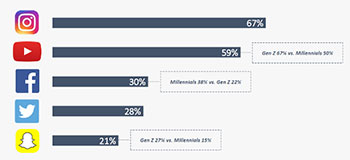When you’re meandering through Twitter, whose accounts do you make sure to check every time? As a marketer or researcher, are you quick to check with @AEdwardsLevy when you have a polling question? Do you seek out charting advice from @EdwardTufte? Do you learn about branding from @IndraNooyi? Are any of these accounts among your go-to, must check, influencers?
- Ariel Edwards-Levy, @AEdwardsLevy, Reporter and polling editor at HuffPost
- Dan Ariely, @danariely, Professor of Psychology and Behavioral Economics
- Data Science Renee, @BecomingDataSci, Creator/Host of Becoming a Data Scientist Podcast
- Diane Hessan, @DianeHessan, Founder/Chair of C Space
- Edward Tufte, @EdwardTufte, Statistician, visualizer, artist, professor
- Eric Salama, @ericsalama, CEO of Kantar
- Indra Nooyi, @IndraNooyi, Board of Directors, Amazon; Former Chair and CEO, PepsiCo
- Rana el Kaliouby, @kaliouby, Co-founder and CEO, Affectiva
- Robert M. Groves, @RobertMGroves, Former U.S. Census Director
Social media has vastly improved our technical ability to connect with people, and influencers can make that connection more personal, particularly for things like apparel and beauty products. To put it in modern perspective, social media influencers of today can be likened to the Avon or the Mary Kay lady of yesterday. They’re like a knowledgeable friend who is fun, entertaining, and also provides helpful advice and inspiration.
As part of our Beneath the Trends series of research reports, we decided to gain a broader understanding of social media influencers among Gen Z and Millennials, particularly in terms of how influencers affect purchases. We designed a 25-minute qualitative interview with 204 people, and probed their responses using an artificial intelligence-moderated conversation.
In this interview, the AI moderator guided people through discussions about their favorite influencers, why they trust them, the types of things they’ve purchased because of their recommendations, and what we like to call ‘the egg or chicken first’ question: Is an influencer more credible if they become famous as an influencer or if they were famous first?
Not surprisingly, the key trait of an Influencer is trust. In fact, 76% of our participants say an influencer who became famous is more credible than a famous person who became an influencer. In other words, influencers need to be real people who aren’t necessarily delivering a sales pitch. They’re simply showing a product in an honest and reliable way.
“They make it seem seamless and less like they are pitching it. It\’s like getting a recommendation from a friend. They are showing me something and I try it. It is pretty easy to do.”
There are, of course, generational differences between Gen Z and Millennials. Where Gen Z followers are more likely to feel a personal connection to influencers, Millennials are more likely to feel distrust. Additionally, Gen Z finds influencers to be a source of entertainment whereas Millennials focus more specifically on the service they provide.
“Their entertainment value and a lot of positive traits about them, such as their values, honesty and if they are funny and caring. I have a hard time being influenced by people who don\’t have similar core beliefs as me.” –Gen Z
Although no individual influencer rises to the top when it comes to who Gen Z and Millennials follow, it’s interesting to see that the top 5, including Jeffree Star, Tati Westbrook, PewDiePie, James Charles, and Kim Kardashian, are all in the beauty industry. This is in keeping with our findings on top categories purchased because of an influencer: apparel (28%) and beauty (27%).
But before you head on over to Facebook to connect with these cohorts, perhaps you ought to set up a couple other social media accounts. Why? Because 67% of influencers are followed most on Instagram and 59% are followed most often on YouTube. And once again, there are generational differences. For example, 67% of Gen Z follow influencers on YouTube compared to only 50% of Millennials. And, 38% of Millennials follow influencers on Facebook compared to only 22% of Gen Z.
Why? Because 67% of influencers are followed most on Instagram and 59% are followed most often on YouTube. And once again, there are generational differences. For example, 67% of Gen Z follow influencers on YouTube compared to only 50% of Millennials. And, 38% of Millennials follow influencers on Facebook compared to only 22% of Gen Z.
So why exactly do people follow influencers? Gen Z finds influencers to be hilarious, genuine, helpful, and inspiring. Similarly, but not quite the same, Millennials find influencers to be funny, honest, providers of a valuable service, and inspiring. When we tease apart humor, Gen Z appreciates quick wit, intelligence, and intriguing viewpoints. However, Millennials appreciate smart, wise, and relatable humor. We can also tease apart being helpful: Gen Z likes to always be learning from a good friend whereas Millennials appreciate that influencers are doing the upfront work to learn about new products.
“They are the closest example of the type of person I want to be, so by following them I learn a lot to implement and improve my life. These can be fashion trends, social cues, health and fitness tips, self- confidence boosting exercises, and dating/relationship advice.” –Gen Z
“I follow them because they offer discounted goods and services with referral codes. I also like finding out about products I haven’t heard of … someone who has already tried and tested and reviewed them so I don’t waste my time or money.” -Millennial
The full report includes many more details, so head on over to the full report on our website to learn more about how Gen Z and Millennials differ in their perceptions of social media influencers. Or, if you’re keen to learn more about generational similarities and differences across a wide range of topics, check out “Generation Nation 2019: Defining America’s Gen Z, Millennials, Gen X and Boomers” on Collaborata.
Beneath the Trend is a series of research studies aimed to learn more about consumer and marketing trends. Leveraging Quester’s artificial-intelligence moderator, we conducted 204 qualitative conversations with Gen Zers and Millennials incorporating customized probing, in-depth language reviews, and quantified qualitative language analysis to quickly deliver rich, qualitative insights about a current trend.
You might like to read these:
- Using AI Qualitative Moderation to Discover Insights about Online Impulse Shopping
- Greenbook Webinar: Using Artificial Intelligence & Linguistics to Disrupt Traditional Innovation Methods
- What Does It Mean to Be Truly Customer Obsessed?
Quester® is award-winning consumer intelligence firm that uses proprietary artificial intelligence technologies to conduct multi-lingual qualitative research on a quantitative scale. We specialize in yielding superior consumer understanding in areas such as innovation, concept development, brand positioning, segmentation, and path to purchase. Our online software-based moderator and analytical software probes deep into participant thought processes, analyzes responses, and allows researchers to make wise business decisions grounded in data, and has netted Quester an EXPLOR Award from the TMRE and an Ogilvy Award from The ARF. Learn about our DIY tools on our website.

